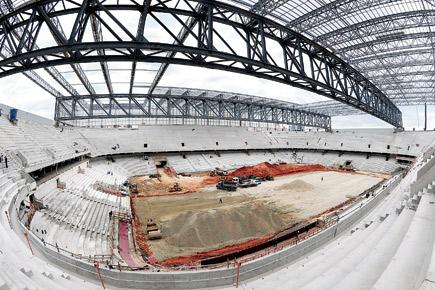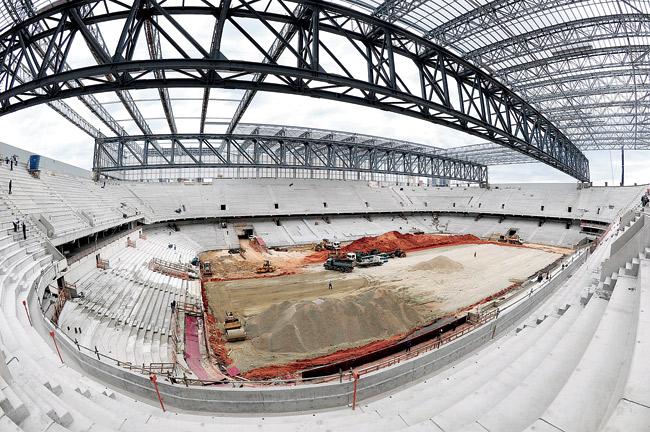Curitiba risks being dropped as a venue for this year's World Cup finals if work on the stadium there fails to make significant progress, FIFA secretary general Jerome Valcke said on Tuesday. "We cannot organise a match without a stadium, this has reached a critical point," said Valcke

Rio de Janeiro: Curitiba risks being dropped as a venue for this year's World Cup finals if work on the stadium there fails to make significant progress, FIFA secretary general Jerome Valcke said on Tuesday. "We cannot organise a match without a stadium, this has reached a critical point," said Valcke.
ADVERTISEMENT

Dec 14, 2013: The Arena da Baixada venue in Curitiba
Valcke, who has not held back from making critical remarks about preparations in the host nation during the lead-up to the finals, said he hoped rapid progress would be made so that Curitiba would not miss out on hosting matches.
Curitiba is set to host four group matches, including the meeting of holders Spain and Australia. "What is there to say?" said Valcke, speaking after paying a visit to the stadium. "It is a delicate question. But let us be frank and direct about it.
"As you must know the present situation at the stadium is not to our liking. "Not only is it very behind in its construction, but it has failed to meet any of the deadlines set by FIFA. "It is not that we want the stadium to be ready by February 18, but simply that we want to see progress made (by the time of the next FIFA evaluation visit).
"A lot of people want to come here, the World Cup holders have to play here," said Valcke, who was roundly criticised by the Brazilians after last year indelicately suggesting the country needed a "kick up the backside."
"We hope, therefore, that the conversations we have had with the State Government and the Curitiba city council will produce the desired results, which will not see the city excluded from the Cup."
It is estimated that the stadium in Curitiba is 90 percent completed but, like many of the other 11 venues, it has been beset by problems. Back in December work at the stadium was temporarily halted when workers walked off the site in protest at not receiving backpay.
As well as fatal accidents at three stadiums -- Sao Paulo, Brasilia and Manaus -- there has been widespread concern at Brazil's ability to overcome logistical issues, including a poor transport network and sky-high hotel prices.
All 12 venues were supposed to meet a FIFA completion deadline of December 31, but world football's governing body was forced to drop the date last month after a slew of delays.
Quite apart from the stadium delays, sagging transport infrastructure across the continent-sized country remains an additional major worry for organisers.
Earlier Tuesday, Brazil's aviation authority revealed that Fortaleza airport in the north of the country is delaying major renovations until after the World Cup, opting for plan B -- an improvised tent terminal.
Fortaleza will stage four games in all, including Brazil's meeting with their Olympic conquerors Mexico on June 17.
Brazil's airport system needs a major overhaul but much of it will not materialise until after the World Cup has been and gone in a country where air travel is often the only way to cover large distances.
FIFA's president Sepp Blatter earlier this month criticised the Brazilians for starting preparations too late after being selected as hosts back in 2007.
President Dilma Rousseff retorted that demand for tickets had been not just hugely oversubscribed but greater than for any other World Cup.
Rousseff insisted that suggested the public at large have faith in Brazil's ability to organise the "Cup of Cups."
The finals run from June 12 to July 13.
 Subscribe today by clicking the link and stay updated with the latest news!" Click here!
Subscribe today by clicking the link and stay updated with the latest news!" Click here!






